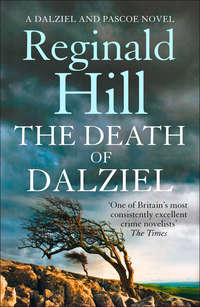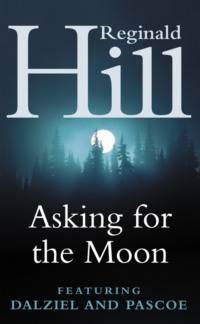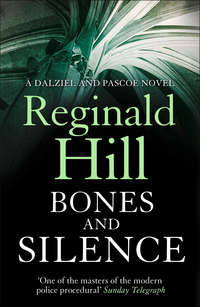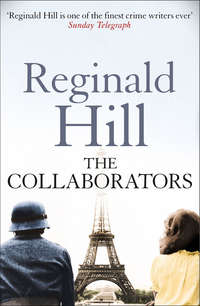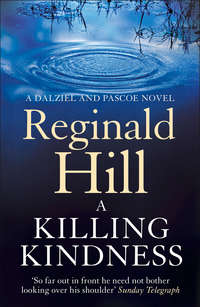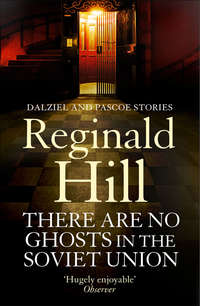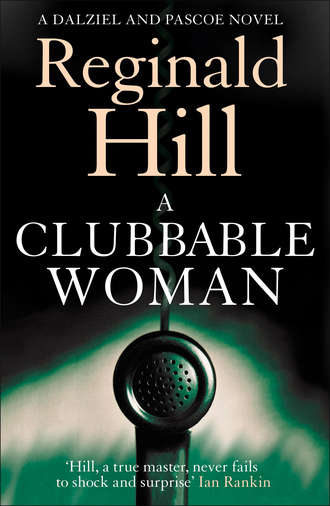
Полная версия
A Clubbable Woman
‘Bloody science. All it does is give us reasons for being imprecise. I can manage that without logarithms.’
‘The cause of death’s a bit more exact, isn’t it, sir?’
‘Oh, yes.’
Dalziel rippled through the papers scattered on the desk before him. Pascoe tried to show none of the offence this lack of organization caused him.
‘Here we are. Skull fracture … bone splinters into frontal lobes … blow from a metal implement, probably cylindrical … administered with great force to the centre of forehead … perhaps long enough to permit a two-handed grip. That’s a great help. Found anything yet, have they?’
‘No, sir.’
‘I should bloody well think not, eh? Not if you knew and I didn’t. Where is this man, anyway?’
Pascoe pushed back his stiffly laundered white cuffs to glance at his watch.
‘The car went for him half an hour ago.’
‘Waiting for him to finish breakfast, I expect. Hearty, I hope. He’ll need his strength.’
Pascoe raised his eyebrows.
‘I thought you said …’
‘I didn’t think he’d done it? But I might be wrong. It’s been known. Twice. But whether he did it or not, if it wasn’t done casually by an intruder, he’ll probably know why it was done. He might not know he knows. But know he will.’
‘Have we dismissed the possibility of an intruder, sir?’
‘We? We? You’re not my bloody doctor. No, I haven’t. But if you look at your bloody scientifically based reports, you’ll see that she seems to have been sitting very much at her ease.’
‘Could it have been from behind? With, say, a narrow-headed hammer. That way you’d get the force …’
‘Pish and cobbles, Pascoe! Didn’t you see the height of that chair-back? And she was sprawling in it at her ease. You’d need arms like an orang-outang. No, I think it was someone she knew pretty well.’
‘And how narrow does that make the field?’
Dalziel grinned lecherously.
‘Not as narrow as you’d think. Twenty years ago there were a hell of a lot of people down at the Rugby Club who knew Mary James pretty well. I’ve had a bit of a nuzzle there myself. And that kind of acquaintance doesn’t get forgotten all that quickly.’
‘You make her sound like a professional.’
‘Don’t get me wrong, son. She wasn’t that. Not even an enthusiastic amateur. She just liked the gay life. There’s one in every club. Where the booze is strongest, the dancing wildest. The girl who doesn’t flinch when the songs get dirty. Who can even join in. It’s the gay crowd she likes, not the slap and tickle in the dark corners. But her image demands she has a large following. And she’s bound to be overtaken from time to time.’
‘Was Connon an overtaker?’
‘Oh no. He was taken over. Your old stager begins to smell danger when the gaiety girl passes the quarter-century with no strong ties. Your young lad’s easy meat, though. Easily frightened too.’
‘Frightened?’
‘They got married at a dead run. Their girl appeared eight months later. Premature, they called it.’
Pascoe listened with distaste to the rasp of laughter which followed.
‘But you’ll find out all about that, my lad. Have a walk down there this lunchtime. They always get a good crowd in. Have a chat with one or two of them. See if anything’s known. They’ll all be eager to natter. Here, I’ve scribbled out a list of who’s who down there. It’s not definitive by any means, but it’ll tell you whether you’re talking to a mate of his – or hers – or not.’
He passed over a scruffy sheet of foolscap, one corner of which looked as if it had been used for lighting a cigarette.
‘You’re best at this stage. If we haven’t sorted this lot out in a couple of days, I’ll drop in for a social drink myself. The tension’ll have gone by then and they’ll all imagine they’re pumping me for information.’
Whereas you pump stuff into barrels, not out of them, thought Pascoe.
Dalziel turned to the window again and took a couple of deep breaths. His fingers drummed impatiently on the sill.
‘Anything in from house-to-house yet?’
‘Not yet, sir.’
‘They’ll all be in bed. Christ. Bloody Sundays!’
There was a long pause. Then …
‘Here he comes,’ said Dalziel, slamming the window shut with even more violence than he had used to open it. ‘Anything you want here, laddie?’
‘Well, no; I mean yes,’ said Pascoe in puzzlement.
‘Grab it and go, then. What’s the matter? Did you hope to see the master at work?’
‘No. But I thought that as you know him – I mean, you are a vice-president of the Rugby Club and something of a friend …’
‘A friend?’ said the superintendent, twisting his fingers in one pouchy cheek so that his big mouth was dragged sinisterly out of shape. ‘You’ve jumped to conclusions, Sergeant. Perhaps I better had let you watch the master some time. He’s a great player, but I never said I liked him. Nor he me. Oh no, I never said I liked him. Push off now. We’ll save you for later if need be.’
Quickly Pascoe gathered a couple of files and some papers together and made for the door. There was a knock and it opened just as he reached it.
‘Mr Connon, sir,’ said the uniformed sergeant standing there.
‘How are you, Mr Connon?’ said Pascoe looking at the pale-faced man who stood a pace or two behind the sergeant.
Solid. Yes, he looked solid all right. Still firm. No flabbiness in the face. Just the paleness of fatigue. But what is it that has drained your blood, Mr Connon? Grief? Or …
‘Please come in, Mr Connon.’ The loud voice broke his thoughts. He glanced round. Dalziel, his face a mask of sympathy so obviously spurious that Pascoe shuddered, was advancing with his hand outstretched. He stood aside to let Connon enter, then stepped out into the corridor leaving them together.
‘He’s like Henry Irving,’ he said to the sergeant, shaking his head.
‘Which one?’
‘Which one? I don’t know. Perhaps both. I’ll be in here if I’m wanted.’
And for all his resentment at his dismissal, he found he wished that he had been wanted.
‘It might be nice to see the master at work.’
The sergeant turned round, but Pascoe had closed the door of his temporary office behind him with a bang.
The sergeant went back to his desk whistling, ‘Dear Lord and Father of mankind’.
It was, after all, Sunday.
‘Sorry to get you out of bed, Mrs Fernie,’ said Detective-Constable Edwards.
‘Don’t apologize,’ interjected Fernie. ‘I told her this might happen last night.’
‘Last night? Why was that, Mr Fernie?’
‘Well, I happened to notice your cars pull up outside Connon’s house …’
‘Happened to notice!’ sneered Alice Fernie, pulling her nylon housecoat closer round her. ‘You must have been stood at that window for half an hour or more.’
Fernie started to reply but the constable interrupted them.
‘The important point to ask both of you is, did you notice anything earlier on?’
‘Anything? What kind of thing? How much earlier?’ asked Alice.
‘Anything at all concerned with the Connons or their house. Any time yesterday.’
‘Well, no. I was over there in the afternoon …’
‘Over there?’ The constable leaned forward.
‘Did you know the Connons well, then?’
‘Mary Connon, I know – knew her very well. We were friends,’ said Alice; then, ‘We were friends,’ she repeated softly to herself, as though the import of the comment was just beginning to sink in.
‘And how did Mrs Connon seem to you then?’
‘Oh fine, fine. Just the same as ever. Nothing out of the ordinary.’
‘Did she say anything that struck you as unusual?’
‘No.’
‘Were there any phone calls? Any callers?’
‘No, nothing.’
‘What time did you leave?’
‘Shortly after four. I don’t know exactly. I came back to get Dave’s tea ready.’
‘What were Mrs Connon’s last words?’
‘Last words?’
‘I’m sorry. I didn’t mean it to sound … what did Mrs Connon say as you left?’
‘Well, nothing really. Cheerio. And something about getting Mr Connon’s tea ready, if he got home in time for it.’
‘What did she mean by that?’
‘Well,’ said Alice, ‘I’m not sure …’
‘Come off it, Alice,’ said Fernie. ‘She meant that if he didn’t get home on time he’d get his own tea. She was a stickler for that, you’ve often told me. And he didn’t get home on time either.’
‘How do you know that?’
‘I saw him. About half past six. And I’ll tell you something else.’
‘Dave!’ said Alice with real annoyance in her voice.
‘What’s that?’
‘He was drunk. Could hardly stand.’
The constable scribbled assiduously in his notebook.
‘You’re certain of that?’
‘Dave!’ said his wife again.
‘Oh yes,’ said Fernie, looking at his wife. She ignored his glance.
‘If you’re finished with me, I think I’ll go back to bed,’ said Alice, standing up so that her housecoat fell open revealing her thin nightdress.
‘Thank you very much, Mrs Fernie,’ said Edwards. ‘You’ve been most helpful. We might want to see you again.’
‘I’ll be ready.’
She went out, leaving the constable smiling and her husband scowling.
‘Now, Mr Fernie. What exactly happened when you met Mr Connon last night?’
‘So that’s all you can tell me, Mr Connon?’
‘That’s right, Superintendent.’
‘You got home about half past six. How positive is that time?’
‘I don’t know. Pretty approximate.’
‘That’s a help. You say the television was on when you stuck your head into the lounge?’
‘That’s right. I see what you mean. There was some variety show. Dancers, girls, not much on. Dancing behind a singer. Big youth, rather Italianate, singing something about flowers.’
Dalziel smiled sardonically.
‘So you were out for four hours?’
‘That’s right.’
‘Nasty that. What’d your doctor say?’
‘I don’t know what his diagnosis was. He just seemed concerned with getting me to bed.’
‘You’ll be seeing him again?’
‘Of course.’
‘I wonder if you’d mind if our man cast his eye over you while you’re down here? It might save your McManus a crisis of conscience.’
Connon smiled wanly.
‘Again I see what you mean. I have no objection.’
‘Good. Good. But first, there’s one thing that puzzles me. You felt sick in the kitchen. You end up by passing out on your bed. Why not be sick downstairs? The kitchen-sink. Or if your notions of hygiene are so strong, why not use the downstairs toilet? I noticed you had one.’
Connon spoke the words of his reply very slowly and distinctly as if learned by rote from a linguaphone record.
‘I did not wish to disturb my wife.’
Dalziel crossed his legs cumbersomely and started prying into his nostrils with thumb and forefinger.
‘Tell me, Mr Connon, Connie, I always think of you as Connie, do you mind?’
‘I always think of you as Bruiser, Superintendent.’
Dalziel was amused and gave a few snorts of laughter.
‘If the name fits, wear it, eh? Give a dog, eh? But yours doesn’t tell us much. Doesn’t fit, does it? Connie. A bit girlish. Which reminds me. You did not wish to disturb your wife. Now me, I’m a blunt Scottish lad by birth, a blunter Northcountryman by domicile. So perhaps the finer points of marital diplomacy have passed me by. (I wish my lad Pascoe could hear me!) But I don’t quite follow the workings of your mind here. You come home, you’re a bit under the weather, your wife ignores you, you’ve got to make your own tea. And you don’t want to disturb her. There are some men would’ve disturbed her. Men you’ve played rugby with who’d have put their boots through the telly screen.’
‘Men who have no respect for their wives do not deserve to keep them, Superintendent.’
That was a mistake, thought Connon. He’s taking it personally.
Dalziel’s wife, now divorced, had gone off with a milkman fifteen years before. At least, she had gone off. The milkman might have been malicious invention.
‘Yes, Mr Connon. You’re right. We should respect those who are weaker than us. Or older. Of course we should. Like forgiving our enemies.’
The phone rang.
‘Excuse me,’ said Dalziel. He listened for a moment.
‘The doctor’s ready for you now, if that’s OK.’
Connon stood up.
‘He won’t keep you long, I expect. Like the Army. Just a cough and a piddle.’
‘Will you want to see me again, Superintendent?’
Dalziel opened the door for him.
‘Just for a moment perhaps. Sergeant!’
The uniformed sergeant who had brought Connon to the room appeared. The expression of unctuous sympathy with which Connon had been greeted reappeared on Dalziel’s face for the first time since the interview began.
‘This is very good of you. It’s a trying time. Sergeant, show Mr Connon to the doctor. And get him a cup of tea, or coffee if you prefer it.’
‘No, thank you,’ said Connon and set off after the sergeant.
‘No,’ said Dalziel to himself as he watched them go. ‘I expect you’ll manage a piddle without it. Or I’m losing my touch. Sergeant Pascoe!’
‘You’re not intending to go down to the Club in that rig, are you, girl?’
Gwen Evans turned before the mirror and peered back over her shoulder.
‘What’s the matter? My bum’s not too big, is it?’
She was wearing a tight-fitting dress of flowered silk, whose style was distantly Chinese in origin.
‘No, but if that slit went any further up the side, you’d be able to see your belly-button.’
‘Don’t be vulgar, Arthur. What’s the matter? Don’t you want me to go to the Club?’
‘No, it’s not that at all …’
‘No? I think you’d much rather have me here slaving over roast beef and two veg, waiting for you to come back full of love and beer.’
‘Be fair, Gwen. Most of the time you complain that I’m too keen to get you down there.’
‘Oh ay. Where you can keep an eye on me at night. But it doesn’t seem to worry you at lunchtime. Do you think I’ve got a time switch on it, then, and can’t get it to work in hours of daylight? You should know better.’
Evans crossed to her in three swift strides. Instinctively she cowered back, holding her hands before her face, but he made no move to strike her. Instead he reached down, seized the hem of her dress and tugged violently upwards.
There was a tearing noise as stitching came apart and the oriental split up the side extended to the waist.
‘There,’ he said. ‘Now you can really see your belly.’
She relaxed, leaned against the wall and began to laugh. At first there was a very faint note of hysteria in it, but this rapidly faded and the laugh deepened to genuine amusement.
‘Give us a fag, will you, Arthur?’ she said finally, regarding her husband with something like real affection. ‘You’re not such a bad old faggot when you’re roused.’
Evans sat on the bed and lit two cigarettes, one of which he passed over to his wife.
‘Thanks,’ she said, drew on it deeply and placed it carefully on the edge of the dressing-table while she began to remove her ruined dress.
Evans watched her impassively.
She went to the wardrobe in her slip and opened its door.
‘Well,’ she said, ‘what’s it to be? Club-wear, or kitchen-wear?’
‘Where were you last night, Gwen?’
‘At the Club with you, dear. Remember?’
She smiled sweetly.
‘Gwen,’ he said, ‘you’re right. It’s a daft question, isn’t it, girl? I know where you were. Or at least who you were with.’
She stiffened and reached down a dress from the hanging rail.
‘Oh, do you?’
‘Yes, of course I do, Gwen. And I suppose if I know, every other sod in the Club has known for months. But I don’t understand you, Gwen. I can see why you encourage all those young lads who come sniffing around you. That’d be flattering to any woman. But a man of my own age. And a friend. What made you pick him, Gwen? What made you pick Connie?’
‘A-1, I hope,’ said Dalziel when Connon reappeared.
‘I hope not, Superintendent. That would mean I couldn’t get better. And I don’t think I’ve recovered from that knock yet. I hope we won’t be much longer.’
‘This is a murder enquiry, Mr Connon. We need your help. Your wife is dead.’
I think that I am at least as aware of that as you, Superintendent. My daughter will be arriving home some time this morning. I’d like to be there to meet her.’
Dalziel looked sympathetic.
‘Of course. A father’s feelings. But have no worries on that score. My sergeant was just telling me. Your daughter’s got here safe and sound. We were able to assist a little there.’
Connon stood up.
‘Jenny? Here? You mean, here?’
‘Oh no. Never worry yourself. I mean at home, of course. We wouldn’t bring her here.’
‘At home. Then I must go.’
Dalziel let him reach the door.
‘Just one question, Mr Connon.’
‘If you must.’
‘You left the Club at twenty to six, and got home about six-thirty. Rather a long time isn’t it? It’s only seven or eight miles at the most. And there’s not much traffic about at that time.’
‘There was enough.’
Dalziel, expert at detecting ironies, thought he heard one here.
‘You didn’t stop for any reason? A drink perhaps? Or had you had enough at the Club?’
‘Why do you ask?’ said Connon quietly.
‘Well, it’s just that we’ve had a statement. Not guaranteed reliable, mark you. But admissible, and voluntary, and therefore carrying some weight. This man …’
‘Which man?’
‘A man called Fernie, says he met you last night. Is that true?’
‘Yes.’
‘About six-thirty?’
‘Yes.’
‘Outside your house?’
‘Yes again.’
‘He says that you were acting oddly. In various ways. He says, in fact he was willing to swear, but we introduced a degree of moderation, as is our wont. He says he got the distinct impression that you were drunk. Very drunk.’
‘Thank you for telling me, Superintendent. Now I must go. Goodbye.’
‘Wait!’ bellowed Dalziel.
Connon turned once more, half out of the door.
‘If you want a fairly precise statement of the amount of alcohol I had taken up to about ten past six, I suggest you contact the constables who administered a breathalyser test to me at that time in Longtrees Road. I thought that this was what you were going on about, not malicious gossip. Good day. I must get to my daughter.’
Dalziel sat for a minute looking at the open door. Then he stood up and walked slowly over to it, scratching the back of his neck with an intensity that made his skin glow redly through the grey stubble.
‘Sergeant,’ he called, pitching his voice low, but with an intensity which easily carried it along the corridor to the desk. ‘Would you step along here for a moment, if you’d be so kind? To discuss an organizational point.’
At the desk, the sergeant stopped whistling.
‘Sorry, we don’t start selling till twelve.’
‘I’m a police officer,’ said Pascoe. ‘I don’t start buying till I’m off duty.’
Sid Hope slowly rose from his crouching position behind the bar.
‘Oh yes? I’m Hope, the club treasurer. What can I do for you? Is there some trouble? About the licence, I mean?’
‘Should there be?’ said Pascoe. ‘You don’t allow non-members to buy drinks, do you? Normally?’
‘Of course not. When we know, that is. But I didn’t know who you were. On my knees, trying to set up a new keg. It’s like a bloody heart-transplant operation getting one of these things operational.’
Pascoe merely looked thoughtful at this attempt to bring in a lighter note.
‘Anyway, I don’t know them all. You could be a member. There’s one or two from the police who are. Superintendent Dalziel for one.’
‘Is that so? How do you run the bar, Mr Hope? A duty roster?’
Sid looked happy to get on to more general ground. ‘That’s right. We have a committee, me in charge, plus half a dozen others. We take it in turn to look after things for a week.’
‘Just one of you? By himself?’
Sid laughed.
‘Not bloody likely. No, we get some of the boys to help us when it’s very busy, like weekends. Or even take over for a couple of nights. Some of us are married, you know. But, like I say, weekends the committee man in charge has really got to be here all the time. It’s not just the serving, but the stock, and the till.’
‘Sounds like hard work.’
‘It is. Like now. Getting things set up for the great rush.’
‘Popular, is it?’
‘Christ, yes. It’s our main source of income. Apart from the odd dance or raffle. We’ve just about paid back our loan now and …’
Pascoe turned on his heel. The man was beginning to be at his ease. He stopped talking at the sight of Pascoe’s back.
‘How many do you get in here on a Saturday night?’
‘I don’t know. Sixty, seventy, and there’s the other …’
‘You’d be on last night?’
‘That’s right.’
‘Busy?’
‘Very.’
‘Was Mr Connon in at all, Mr Sam Connon?’
‘Connie? No. Well, yes. I mean he was in at the beginning of the evening right after the match. Look, what’s all this about? Have you got any proof you really are a policeman?’
‘I thought you’d never ask.’
Pascoe produced his warrant card. Sid examined it closely.
‘What time did Connon leave?’
‘I’m not sure. About five-thirty. Quarter to six, I think. I can’t say for certain. He stopped to have a word with Arthur on his way out, but he might just have gone through into the other room.’
‘Arthur?’
‘Evans. Captain of the Fourths. That’s right. Connie had been playing. Got a knock. Wanted a medicinal scotch. Hello, Marcus.’
Pascoe looked to the doorway. Standing there was a short fleshy man dressed in slacks and a polo-neck sweater. Pascoe felt that he had been standing there for some time.
Now he came into the room.
‘Hello, Sid. Sorry I’m late again.’
‘That’s all right. I’ve been managing. As long as you didn’t send Ted.’
Marcus didn’t look at Pascoe but went behind the bar as though he wasn’t there and began to busy himself with bottles.
‘Marcus,’ said Sid, ‘this is – who is it?’
‘Sergeant Pascoe.’
‘Sergeant Pascoe. He’s asking about Connie.’
Marcus looked at Pascoe now.
‘What about Connie?’
‘You know his wife?’
‘Mary? Yes. What about her?’
‘Was she a friend?’
Sid and Marcus looked at each other.
‘Not exactly. But I know her pretty well. Connie’s a close friend,’ said Marcus.
‘Why do you say “was”?’ asked Sid.
‘She’s dead I’m afraid.’
You learn nothing from their faces, thought Pascoe. A split second of surprise, incredulity, shock; perhaps not even that. Then they’re all busy arranging their features to the right expression.
‘She was killed last night. I’d like to ask a few more questions, please.’
Marcus sank down on a bar stool. His left foot hooked repeatedly at a non-existing cross-rail.
‘Where is Connie?’ he said.
‘I don’t know. Home by now, I expect. His daughter’s arriving.’
‘Jenny. That’s good. That’s good.’
But the look on his face didn’t seem to go with the words somehow.
‘Daddy?’
‘Yes.’
‘Is that you?’
‘Yes.’
She was sitting on the edge of a dining-room chair like a nervous candidate for interview.
For a moment they looked at each other as though this indeed was why she was there.
Then she ran to his arms and sobbed once into the wool of his overcoat, then rested there quietly for a long minute.
‘Come and sit down, Jenny,’ he said.
‘Yes.’
They sat side by side at the table.
‘Why don’t you take your coat off?’ he said.
‘Why don’t you?’


